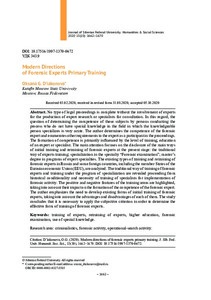Modern Directions of Forensic Experts Primary Training
Скачать файл:
URI (для ссылок/цитирований):
https://elib.sfu-kras.ru/handle/2311/137546Автор:
D'iakonova, Oksana G.
Дьяконова, О. Г.
Дата:
2020-10Журнал:
Журнал Сибирского федерального университета. Гуманитарные науки. Journal of Siberian Federal University. Humanities & Social Sciences;2020 13 (10)Аннотация:
No type of legal proceedings is complete without the involvement of experts for the production of expert research or specialists for consultation. In this regard, the question of determining the competence of these subjects by persons conducting the process who do not have special knowledge in the field in which the knowledgeable person specializes is very acute. The author determines the competence of the forensic expert and enumerates other requirements to the expert as a participant in the proceedings. The formation of competence is primarily influenced by the level of training, education of an expert or specialist. The main attention focuses on the disclosure of the main ways of initial training and retraining of forensic experts at the present stage: the traditional way of experts training; specialization in the specialty “Forensic examination”; master’s degree in programs of expert specialties. The existing types of training and retraining of forensic experts in Russia and some foreign countries, including the member States of the Eurasian economic Union (EEU), are analyzed. The traditional way of training of forensic experts and training under the program of specialization are revealed proceeding from historical conditionality and necessity of training of specialists for implementation of forensic activity. The positive and negative features of the training areas are highlighted, taking into account their impact on the formation of the competence of the forensic expert. The author emphasizes the need to develop existing forms of initial training of forensic experts, taking into account the advantages and disadvantages of each of them. The study concludes that it is necessary to apply the subjective criterion in order to determine the effective form of training of forensic experts Практически ни один вид судопроизводства не обходится без привлечения экспертов для производства экспертного исследования или специалистов для
консультации. В этой связи весьма остро встает вопрос определения компетентности этих субъектов лицами, ведущими процесс, не обладающими специальными знаниями в той области, в которой специализируется сведущее лицо. Автором
определяется компетентность судебного эксперта и перечисляются иные требования к эксперту как участнику судопроизводства. На формирование компетентности
в первую очередь влияет уровень подготовки, образование эксперта или специалиста. Основное внимание уделяется раскрытию основных путей первоначальной
подготовки и переподготовки судебных экспертов на современном этапе: традиционный путь подготовки экспертов; специалитет по специальности «Судебная экспертиза»; магистратура по программам экспертных специальностей. Анализируются существующие виды подготовки и переподготовки судебных экспертов в России
и некоторых зарубежных странах, в том числе странах – участницах Евразийского
экономического союза (ЕАЭС). Традиционный путь подготовки судебных экспертов и обучение по программе специалитета раскрываются исходя из исторической
обусловленности и необходимости подготовки специалистов для осуществления
судебно-экспертной
деятельности. Выделяются позитивные и негативные черты
направлений подготовки с учетом их влияния на формирование компетентности
судебного эксперта. Автор подчеркивает необходимость развития существующих
форм первоначальной подготовки судебных экспертов с учетом достоинств и недостатков каждой из них. Сделан вывод о необходимости применения субъектного
критерия в целях определения эффективной формы подготовки судебных экспертов
Коллекции:
Метаданные:
Показать полную информациюСвязанные материалы
Показаны похожие ресурсы по названию, автору или тематике.
-
Оценка вероятностных выводов экспертов в уголовном процессе
Кудрявцева, А. В.; Кириллова, Н. П.; Кочемировский, В.А.; Стойко, Н. Г.; Пристансков, В. Д.; Kudryavtseva, Anna V.; Kirillova, Natalia P.; Kochemirovsky, Vladimir A.; Stoyko, Nikolay G.; Pristanskov, Vladimir D. (Journal of Siberian Federal University. Сибирский федеральный университет, 2024-01)В статье рассматриваются различные теории, лежащие в основе классификации выводов эксперта и подходов к определению вероятности в экспертной практике и праве. По мнению авторов, при расчете вероятности возможно ... -
System of Methods, Techniques and Means as a Condition of Success for Vocational Training of Manager Personality
Panasenko, Galina V.; Shendel, Tatiana V.; Панасенко, Г.В.; Шендель, Т.В. (Сибирский федеральный университет. Siberian Federal University., 2014-10)The subject of this study is a systematic analysis of methods, techniques and means of retraining the manager personality. The problem indicated in the article, concerns the social order of society for training specialists ... -
Modern Theory of Visual Art: Regional Project
Zhukovskiy, Vladimir I.; Жуковский, В.И. (Сибирский федеральный университет. Siberian Federal University., 2014-08)The article defines the main notions of the modern visual art theory, studies the process of creating artistic appearance in the relation-dialogue between the recipient and the object-work, determines the role of an art ... -
The Method of Expert Interview as an Effective Research Procedure of Studying the Indigenous Peoples of the North
Libakova, Natalia M.; Sertakova, Ekaterina A.; Либакова, Н.М.; Сертакова, Е.А. (Сибирский федеральный университет. Siberian Federal University., 2015-01)This article analyzes the concept of “indigenous peoples”, as well as the concept of indigeneity that was formed in cultural studies and that implies a specific approach to the study of ethnic cultures in their ... -
Freedoms and Constraints of a Specialist’s Training at the Modern Stage of Higher Professional Education Development in Russia
Pakhalian, Victor E.; Пахальян, В.Е. (Сибирский федеральный университет. Siberian Federal University., 2015-01)The article analyses the issue of freedoms and constrains in practice of a specialist’s training at the modern stage of higher professional education development in Russia. The use of such terms as ‘profitability’, ...

